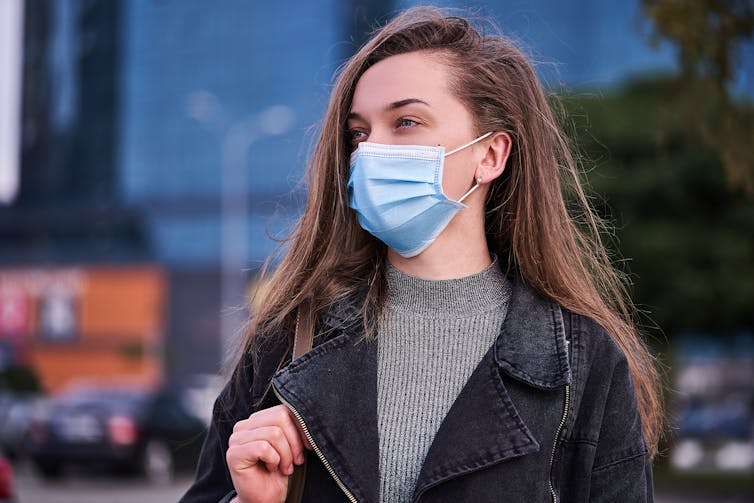
Two new omicron subvariants, BQ.1 and BQ.1.1, are quickly gaining traction in the US, collectively accounting for 27% of infections as of October 29. Both are descendants of BA.5, the omicron variant that has dominated around the world for some months.
Although they appear to be most common in the US at this stage, BQ.1 and BQ.1.1 have also been identified in the UK and several countries in Europe, with the European Centre for Disease Prevention and Control (ECDC) having classified BQ.1 as a variant of interest.
Based on modelling estimates, the ECDC expects that by mid-November to the beginning of December 2022, more than 50% of COVID infections will be due to BQ.1 and BQ.1.1. By the beginning of 2023, they could account for more than 80% of cases.
When we hear about new COVID variants, three key questions spring to mind: is it more transmissible compared with previous variants? Can it cause more severe illness? And can it escape our immune response? Let’s take a look at what we know so far.
1. Are these variants more transmissible?
Transmissibility refers to the capacity of a pathogen to be able to be passed from one person to another. This characteristic is determined by many factors relating to the pathogen, its host and the environment.
At this stage, we have limited data on how transmissible these two new variants are. But BQ.1.1 appears to be highly transmissible, with social media reports calculating it took only 19 days to grow eight-fold from five sequences to 200 sequences.
Although BQ.1 and BQ.1.1 currently comprise a small proportion of all COVID cases globally, in some countries the proportion of cases is increasing at a rate which suggests it’s more transmissible than other circulating variants.
Read more: COVID vaccines: an annual booster like the flu shot could be the way forward
2. Can they escape our immune system?
The ECDC suggests the observed increase in the growth rate of BQ.1 is probably driven mainly by immune escape. This refers to the virus’ capacity to evade our immune response from prior infection or vaccination.
BQ.1 and BQ.1.1 contain mutations to the spike protein, a protein on the surface of SARS-CoV-2 (the virus that causes COVID-19) which allows it to attach to and infect our cells. These mutations include K444T, N460K, L452R and F486V. BQ.1.1 contains an additional mutation, R346T, also found in the BA.5 variant.
These mutations have been associated with significant immune escape and antibody evasion.

One study indicated that it’s likely that immunity induced by infection from previous omicron sublineages and vaccination will not provide broad protection against BQ.1.1 infection. However this study is a preprint, meaning it’s yet to be peer-reviewed.
Although the current COVID vaccines and previous infections provide good protection against severe disease, they do not provide full protection from infection or reinfection. Likewise, while they reduce COVID transmission, they do not prevent it entirely. And these new variants appear to have the highest capacity for immune evasion yet. That said, COVID vaccines will continue to offer strong protection against severe disease and death.
3. Can they cause more severe illness?
We still don’t know much about the severity of illness associated with BQ.1 or BQ.1.1. But based on the limited data available, the news is good on this front. There’s no evidence that BQ.1 is associated with more severe illness than BA.4 and BA.5.
Worryingly though, a recent preprint study suggests that BQ.1.1 could be resistant to Evusheld, an antibody therapy designed to protect people who are immunocompromised and don’t respond as well to COVID vaccines.
Read more: Another new COVID variant is spreading – here's what we know about omicron BA.4.6
The pandemic is not over yet
Beyond the US and Europe, BQ.1 and BQ.1.1 have also been identified in other countries around in the world including New Zealand, Thailand, Singapore and Canada, where they’ve been detected in wastewater. Sewage samples often give us a good indication of possible COVID spikes.
The continued emergence of new COVID variants indicates that the virus is very much still with us, and rapidly evolving. As we face resurgences heading into winter in the northern hemisphere, we need to keep our eyes on these and any other new variants, and carefully observe how they behave.
We also need studies which test how well the new bivalent vaccines – those which target omicron alongside the original strain of SARS-CoV-2 – work against BQ.1 and BQ.1.1.
Manal Mohammed does not work for, consult, own shares in or receive funding from any company or organisation that would benefit from this article, and has disclosed no relevant affiliations beyond their academic appointment.
This article was originally published on The Conversation. Read the original article.







